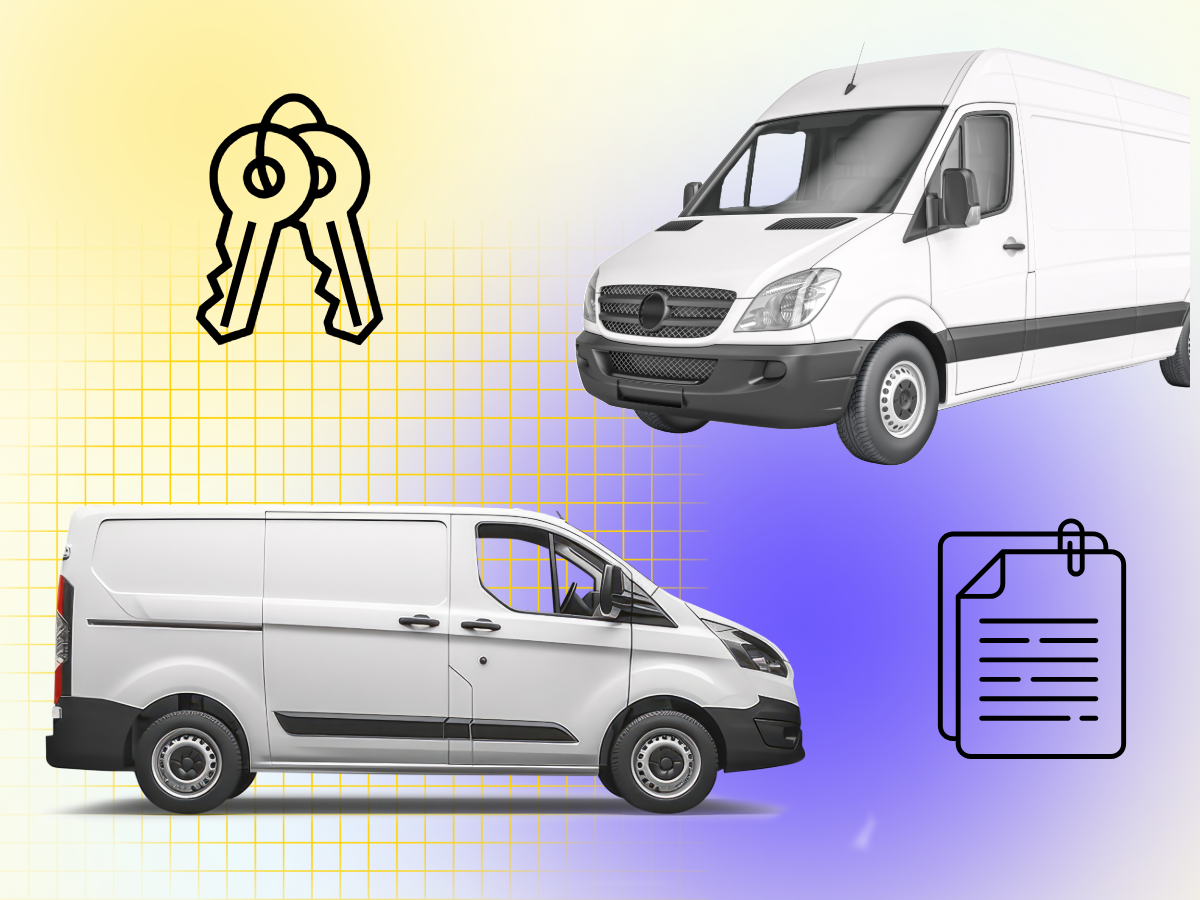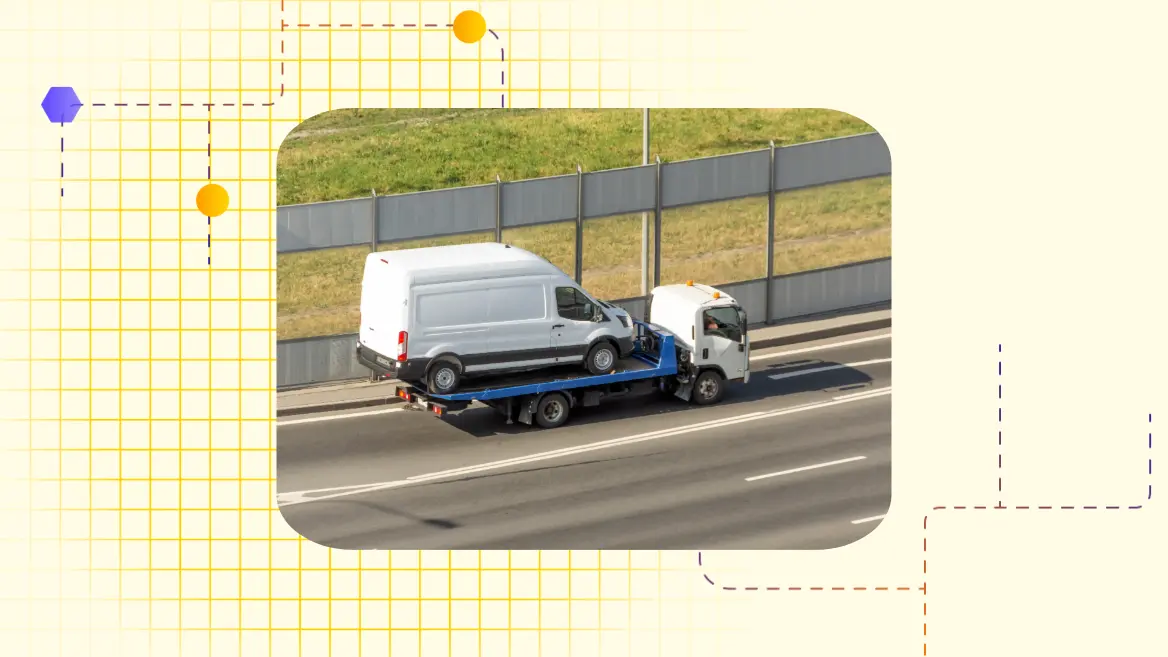When you’re starting as an owner-driver, you need to think carefully about how you’ll acquire a van.
You’ve got three main options: buy, lease, or hire a courier van. Each comes with advantages and drawbacks, depending on your budget, how long you plan to use it and how much flexibility you need.
Get access to 13,000+ courier loads a day on Courier Exchange
Be your own boss. Set your own hours. Make your own money.
What we’ll cover
Buying your courier van: The long-term investment
Buying a van is the most straightforward option, and gives you full control over your vehicle. You don’t have to worry about lease agreements or rental terms, and you can use it as much as you like. There’s no mileage limit, which is useful if you want to maximise your income, working long hours or covering large distances.
Owning a van also means you can sell it later, recovering some of your costs. If you take good care of it, you might get a good resale price when the time comes to upgrade. You also avoid ongoing lease or rental payments, which are much more expensive in the long run.
But buying your own van comes with responsibilities. The upfront cost can be high, especially if you’re purchasing a newer model. And you’ll need to budget for maintenance, servicing, and unexpected repairs.
Depreciation is also something to keep in mind – your van will lose value over time. If you plan to keep the van for years, this might not matter. But if you intend to upgrade regularly, leasing might be the better option.
Buying a courier van works best for those who are sure they want to stay in the industry long-term. Although the up-front cost is high, it will be the most cost-effective option overall. And it allows you to take on as much work as you want without worrying about mileage limits.
Leasing: Fixed costs with some flexibility
Leasing a courier van offers a middle ground between buying and hiring. You get a reliable vehicle without paying a large sum upfront. Instead, you pay a fixed amount each month for an agreed period, usually between two and five years.
One of the biggest benefits of leasing is you can predict your costs. Fixed monthly payments make budgeting easier, as you won’t face unexpected repair bills. Many lease agreements include road tax, and some also cover maintenance. This can help you avoid some surprise expenses, making it easier to manage cash flow.
But leasing does come with restrictions. Many contracts include mileage limits, which means you need to estimate your usage carefully or else you’ll have to pay extra charges. If your work varies from month to month, this can be a challenge – especially in peak seasons.
Another factor to consider is contract length. Leasing ties you in for a set period, and ending the agreement early can be expensive. Some providers charge hefty fees if you want to cancel before the contract ends.
At the end of the lease, you don’t own the van unless you choose a lease-to-buy option. But if you want a newer van without the financial commitment of purchasing, leasing can be the best solution.
Hire a courier van: Maximum flexibility (at a higher cost)
If you’re looking for the most flexible option, that is to hire a courier van. It’s a great choice if you’re just starting out, testing the market, or need a short-term solution. Instead of committing to a long-term lease or purchase, you can hire a courier van as needed.
One of the biggest advantages when you hire a courier van is convenience. Most rental agreements include breakdown cover, maintenance, and servicing, so you don’t have to worry about unexpected repairs. If something goes wrong, the rental company sorts it out. This makes hiring ideal for couriers who want a hassle-free option.
But to hire a courier van isn’t the cheapest option in the long run. Daily or weekly rental fees add up quickly, making it more expensive over time. If you plan to work as a courier for years, buying or leasing will cost you less overall.
Another downside is that you don’t build any equity in the van. Unlike buying, where you can sell the vehicle later, when you hire a courier van you’re always paying for something you don’t own. Availability can also be an issue, especially during peak seasons when demand for rental vans is high.
Renting suits those who need a courier van for short periods (like if your own van breaks down) or new starters who want to keep commitments low. If you’re unsure whether the courier industry is right for you, you can hire a courier van as a low-risk way to get started. But if you’re planning to build a courier business for the long-term, leasing or buying will be better value.
Which option suits your business best?
Choosing between whether to buy, lease or hire a courier van depends on your budget, business plans, and how much flexibility you need.
Buying works well for those who want full ownership and are happy to manage maintenance themselves. It’s a long-term investment that offers complete control, but it requires a higher upfront cost and ongoing upkeep. If you want to avoid monthly payments and mileage limits, buying could be the right choice.
Leasing is ideal for those who want a reliable van without a large upfront expense. The fixed monthly payments help with budgeting, and some contracts include courier van maintenance, making costs more predictable. But mileage restrictions and early exit fees mean it’s not as flexible as hiring.
Hiring is best for those who need a short-term solution or want to keep options open. It’s a low-commitment way to access a van, with maintenance and breakdown cover included. But it can be expensive over time, and you won’t own the vehicle.
Many successful couriers hire a courier van to start with, and after testing the waters move on to leasing as their business grows, and then buy once they’re confident in their long-term plans. The right option depends on your financial situation, workload, and how much freedom you want over your vehicle.
Choosing the right van is an investment
Your van is one of the most important parts of your courier business, so picking the right option matters. Think about how long you plan to use the van, your budget, and how much flexibility you need.
For example, if you want to offer specialist services like dangerous goods deliveries or even chilled courier transport, you’ll need to factor in the cost of equipment and certifications alongside the cost of your van.
If you want to join the Courier Exchange as an owner-driver, you can do so whether you own your van outright, lease it, or use a hire van – as long as you have the right courier insurance.




